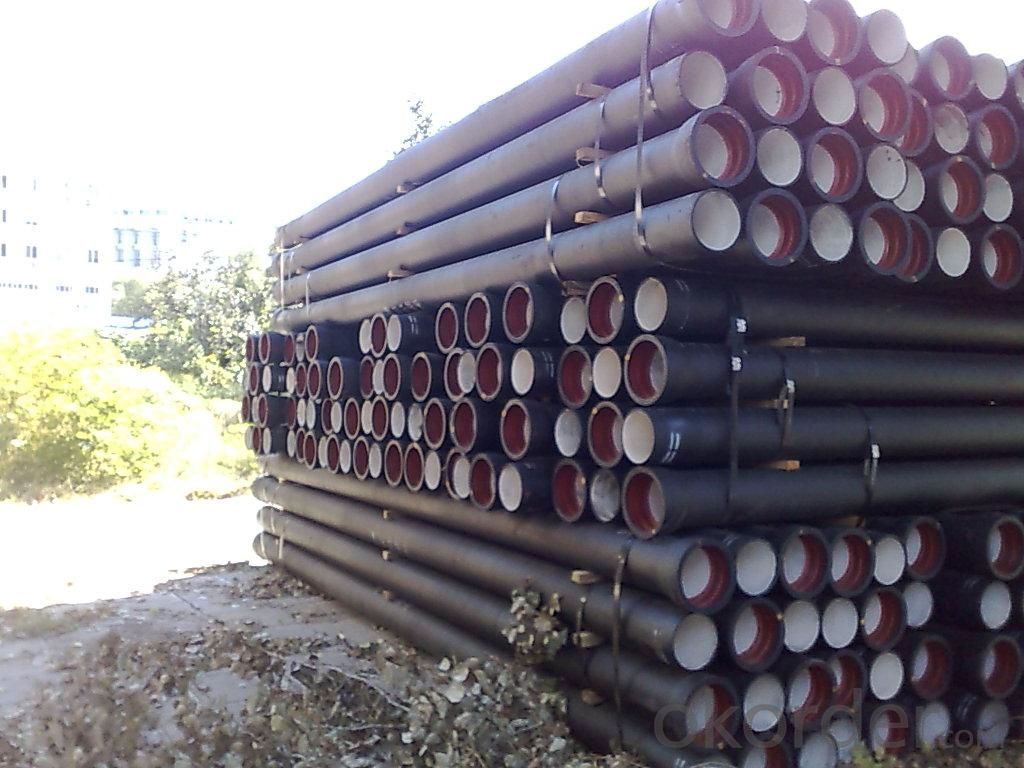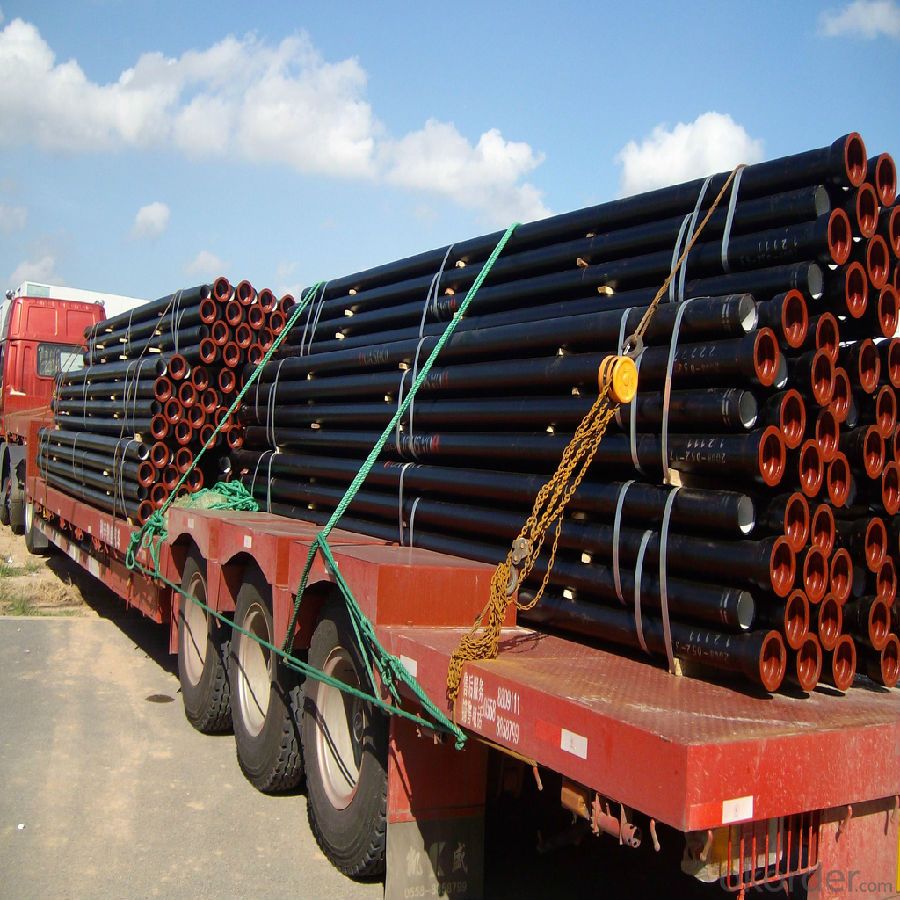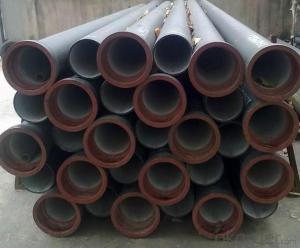Ductile Iron Pipe of China DN800 EN598 Hot Sale
- Loading Port:
- China main port
- Payment Terms:
- TT or LC
- Min Order Qty:
- 25 m.t.
- Supply Capability:
- 100000 m.t./month
OKorder Service Pledge
OKorder Financial Service
You Might Also Like
1,Ductile Iron Pipe Description :
1) Pipes confirm to ISO2531,K9 class,T type joint,6m long,with inside cements lining conform to ISO4179, outside Zinc spraying(130g/m2) and bitumen coating(70μm) conform to ISO8179.
2) Pipe ends: Spigot and socket ends, with 100% SBR rubber gaskets accoding to ISO4633
3) we can do third party inspection according to customer's request.
4) Our products have been sold to many international market, such as Middle East and South East Asia and Africa.
2,Main Features of the Ductile Iron Pipe:
•High yield strength
•High tensile Strength
•High corrosion resistance
•Pressure Resistence
•Anti-corrosion
•Installation is convenient
1).Packing and Shipping
• standard export package(carton/wooden case/pallet)
• accept FOB,FAS,CNF,CIF door to door etc or customer designated shipping agent
2).Service
• Drawing: we can translate your original drawing, offer best suggestion on design
• Quality: we have full set quality control system to guarantee the best quality.
• Inspection: inspect in house, all our products must be checked 3 times before packing
3)Inspection
• In-house Foundry
• Third party inspection available upon requirement
4) Our goal
• To be your preferred partner
3,Ductile Iron Pipe Images:


4. Ductile Iron Pipe Specification:
Standard: API SPEC 5L 44th eidtion,ASTM A252-98(2007)
Grade: A53 Grades A/B, ASTM A106 Grades B/C,ASTM A179
AWWA, C200, ASTM A139, ASTM A120, API 5L Grade B
X42, X52, X56, X60, X65, X70, X80, X100
Weld Alternatives: LSAW
OD size range: 6.4~44.5mm
Wall thickness: 406.4~1422mm
Length: 3 - 12 m according to requirment
Note: Other grade can also be provided after consulting. Special design are available
for coal slurry conveyance LSAW line tube -- Service
External coating: ductile iron pipes shall be externally coated with metallic zinc spray plus a further layer of resin painting to ISO8179.
Gasket: 100% SBR/NBR/EPDM rubber gasket in accordance with ISO4633.
Packing: ductile iron pipes from DN100 to DN300 be bundled with steel belts, others are in bulk.
Payment term: L/C, T/T.
Packing: In bulk vessel or in container
5.FAQ:
We have organized several common questions for our clients,may help you sincerely:
1.Q: Why would you choose ductile iron pipe rather than other pipe materials?
A:The reasons are obvious for that not only ductile iron pipe possesses the inherent strength and flexibility of ductile iron, combined with proven corrosion protection systems, but also the cost savings can be achieved from design to installation and commissioning.
2.Q:Why can you guarantee the inner of pipes can’t be corroded?
A: High alumina cement mortar lining and sulphate-resistant cement mortar lining. These two special linings are applicable to inner anti-corrosion for sewage pipes, improving resistance to erosion of the sewage components.
- Q:Can ductile iron pipes be used for water supply in buildings?
- Yes, ductile iron pipes can be used for water supply in buildings. Ductile iron pipes are known for their strength, durability, and corrosion resistance, making them suitable for carrying water in both residential and commercial structures. They have a long lifespan, high pressure rating, and can withstand various environmental conditions, making them a reliable choice for water distribution systems.
- Q:Are ductile iron pipes suitable for pressure sewer systems?
- Ductile iron pipes, known for their high strength and durability, are a suitable option for pressure sewer systems. They have been widely used in various applications, including pressure sewer systems, due to their ability to withstand high pressure and provide a long-lasting solution for transporting sewage under pressure. One key advantage of ductile iron pipes is their excellent corrosion resistance, which is crucial in sewer systems where they are exposed to various chemicals and contaminants. These pipes are resistant to both internal and external corrosion, ensuring their durability and functionality over time. Moreover, ductile iron pipes have a smooth internal surface, minimizing friction and improving the flow capacity of the sewer system. This feature allows the pipes to handle the required flow rates and prevent blockages or backups. Additionally, ductile iron pipes are known for their ease of installation. They can be easily cut and joined using various methods, making them a convenient choice for pressure sewer systems. Overall, ductile iron pipes offer a reliable choice for pressure sewer systems, thanks to their high strength, corrosion resistance, smooth internal surface, and ease of installation.
- Q:How do ductile iron pipes handle water hammer in high-rise buildings?
- Known for their durability and strength, ductile iron pipes are an excellent option for managing water hammer in high-rise structures. Water hammer, a common occurrence when water flow abruptly halts or changes direction in pipes, causes pressure surges that can strain and potentially harm the pipes. Engineered to withstand high-pressure scenarios, ductile iron pipes exhibit remarkable resistance to water hammer. With their high tensile strength, these pipes can endure sudden pressure changes without warping or fracturing. This feature is especially crucial in high-rise constructions where water distribution must accommodate various floor pressures. Furthermore, the outstanding corrosion resistance of ductile iron pipes bolsters their ability to handle water hammer. Over time, corrosion weakens pipes, making them more prone to failure during pressure surges. However, the corrosion resistance of ductile iron pipes guarantees their structural integrity even in high-pressure circumstances. Moreover, the flexibility of ductile iron pipes enables them to absorb and dissipate the energy generated by water hammer. Consequently, the overall system experiences minimal impact, reducing the potential for damage. Absorbing energy also contributes to minimizing noise and vibrations associated with water hammer, thus enhancing the efficiency and comfort of the water supply system. To summarize, ductile iron pipes are well-suited to manage water hammer in high-rise buildings. Their strength, corrosion resistance, and flexibility make them a reliable choice for delivering water under varying pressures while upholding the system's integrity.
- Q:What is the difference between flexible joint mechanism and seismic cast iron pipe DN100 and ductile iron pipe?
- Nodular cast iron has high strength and strong plasticity. The tensile strength of ductile iron is twice that of gray iron, and the yield strength even exceeds that of cast steel.
- Q:QT400-10 nodular cast iron requires hardness of HRC47~51. Why can't quench hardness be reached?
- Because of the high tempering stability of the nodular iron, the tempering temperature is 400-450 degrees, and the tempering time is 1 hours.
- Q:What are the different coatings available for ductile iron pipe?
- There are several different coatings available for ductile iron pipe, each offering unique benefits and protection for various applications. Some of the most commonly used coatings include: 1. Cement Mortar Lining: This coating involves applying a layer of cement mortar to the interior surface of the pipe. It provides excellent resistance against corrosion and abrasion, making it suitable for transporting water and sewage. 2. Bituminous Coating: Bituminous coatings consist of a layer of asphalt or coal tar pitch applied to the pipe surface. This coating offers good protection against corrosion and is often used for underground pipes in water and wastewater systems. 3. Fusion-Bonded Epoxy (FBE) Coating: FBE coatings are created by electrostatically applying a layer of epoxy powder to the pipe surface, followed by curing it at high temperatures. This coating provides exceptional resistance against corrosion and is commonly used in applications where the pipe is exposed to harsh environments or corrosive substances. 4. Polyurethane Coating: Polyurethane coatings offer excellent resistance against abrasion, impact, and corrosion. They are often used for pipes that are exposed to abrasive materials or require additional protection against external damage. 5. Zinc Coating: Zinc coatings, also known as galvanized coatings, involve applying a layer of zinc to the pipe's surface. This coating provides excellent protection against corrosion, making it suitable for pipes that are exposed to moisture and aggressive environments. 6. Polyethylene Encasement: Polyethylene encasement involves wrapping the pipe with a layer of polyethylene film or tape. This coating provides a physical barrier against corrosion and is commonly used in conjunction with other coatings for added protection. It is essential to consider the specific requirements of the application, such as the type of fluid being transported and the environmental conditions, to determine the most suitable coating for ductile iron pipes.
- Q:What is the average weight of ductile iron pipes?
- The weight of ductile iron pipes can differ based on their specific dimensions and specifications. However, as a general rule, the weight of ductile iron pipes usually falls within the range of 50 to 200 pounds per foot. Various factors, including the pipe's diameter, wall thickness, and length, affect its weight. It is essential to understand that these weights are averages, and the actual weight of a particular ductile iron pipe may differ. To accurately determine the weight of a ductile iron pipe, it is recommended to consult the manufacturer's specifications or engineering guidelines.
- Q:Why is the sound speed of nodular cast iron lowered after heat treatment?
- After the heat treatment, the microstructure of the material changes, the graphite changes, eliminating the internal stress of molecules, thus slowing down the speed.
- Q:Can the underground cast iron pipes be connected with clamps to form buttress?
- Best not to, because the use of clamp connection way to connect the poor integrity of the pipeline, the base treatment is not in place or uneven settlement, it is easy to produce deformation, resulting in pipe bending deformation, easily leaked from the junction.
- Q:What is the expected pressure rating for ductile iron pipes?
- The expected pressure rating for ductile iron pipes typically ranges from 150 to 350 psi.
1. Manufacturer Overview |
|
|---|---|
| Location | |
| Year Established | |
| Annual Output Value | |
| Main Markets | |
| Company Certifications | |
2. Manufacturer Certificates |
|
|---|---|
| a) Certification Name | |
| Range | |
| Reference | |
| Validity Period | |
3. Manufacturer Capability |
|
|---|---|
| a)Trade Capacity | |
| Nearest Port | |
| Export Percentage | |
| No.of Employees in Trade Department | |
| Language Spoken: | |
| b)Factory Information | |
| Factory Size: | |
| No. of Production Lines | |
| Contract Manufacturing | |
| Product Price Range | |
Send your message to us
Ductile Iron Pipe of China DN800 EN598 Hot Sale
- Loading Port:
- China main port
- Payment Terms:
- TT or LC
- Min Order Qty:
- 25 m.t.
- Supply Capability:
- 100000 m.t./month
OKorder Service Pledge
OKorder Financial Service
Similar products
New products
Hot products
Related keywords



























